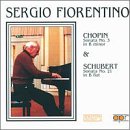| All Artists: Frederic Chopin, Franz [Vienna] Schubert, Sergio Fiorentino Title: The Fiorentino Edition 2 Members Wishing: 0 Total Copies: 0 Label: Apr UK Release Date: 12/16/1997 Genre: Classical Styles: Chamber Music, Forms & Genres, Sonatas, Historical Periods, Classical (c.1770-1830), Romantic (c.1820-1910) Number of Discs: 1 SwapaCD Credits: 1 UPC: 034065755322 |
Search - Frederic Chopin, Franz [Vienna] Schubert, Sergio Fiorentino :: The Fiorentino Edition 2
 | Frederic Chopin, Franz [Vienna] Schubert, Sergio Fiorentino The Fiorentino Edition 2 Genre: Classical
|
Larger Image |
CD Details |
CD ReviewsJoining distinct artistic traditions Michael Whincop | GRIFFITH UNIVERSITY, QLD AUSTRALIA | 10/23/2000 (5 out of 5 stars) "Compared to other great pianists, defining Fiorentino's distinctive attributes can be challenging. He doesn't have the nervous energy of Horowitz, the patrician severity of the mature Michelangeli, or the mesmerism of Sofronitsky. On the contrary, many of the interepretive parameters he chooses are remarkably free from idiosyncracy and seem unsually central. What I think Fiorentino captures, like no other pianist, is the capacity to distill the wisdom of a range of interpretive traditions in a uniquely personal and fresh way.This is well illustrated on this disk, in which Fiorentino ventures into repertory that has been more recorded than anything else in his studio series. There are two discrete traditions in the Chopin Third -- a grander, more symphonic tradition, with which I associate Gilels and more recently Demidenko, and a lyrical, more pianistic tradition, which includes Rubinstein, Cortot, Lipatti, and Argerich. Fiorentino seems to capture them both, giving great weight to the opening figure, but showing tremendous flexibility and poise in his singing of the second subject. The scherzo has a fleetness that is beautifully fingered but never seems superficial or showy. The third movement has never been more gloriously imagined. The tempo is broad, but the legato is seamless, allowing the artist to show up the work's fine details in loving attention. The final movement returns to the weighty tone of the first movement, but the work closes with all the spark and exultation of Argerich or Kapell. Together with his Saga nocturnes, the Second Sonata on the live APR disk, and the live Rhode Island recital, Fiorentino offers us in this disk a wholly convincing Chopin, one as close to Bach as to Bellini.The same holds true of the inspired B flat sonata. The lines of tradition are drawn very clearly here. In the left corner, we have the Russians, Afanassiev, Richter and Sofronitsky, who search out Winterreise darkness in achingly slow tempi. In the right corner, we have the more Germanic tradition, which is more flexible and lyrical. Fiorentino undermines the sense of disparity by rendering the work in a tone of personal sadness rather than cosmic despair. His first movement is very broad, taking 16 minutes without the exposition repeat -- faster than Richter, but not by that much. He emphasises the lyricism of phrasing more than the Russians typically do, but achieves the same sense of overwhelming passion in the development's climax. The slow movement has a similarly implicit approach to loss, so that the second subject sounds like hope, rather than delusion, after the pain of the first. The third movement is absolutely fresh -- it dispels the shadows without forgetting they exist, by subtle accents in the trio. The fourth movement -- always a challenge for Schubert -- is played with great breadth, once again bringing together the two interpretive traditions in this work. In short, whatever other performances you may own of these works, I urge you to hear these wholly convincing recreations, that are imaginative without seeking controversy for its own sake."
|

 Track Listings (8) - Disc #1
Track Listings (8) - Disc #1